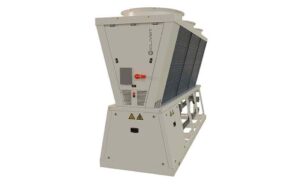Poor indoor climate hits productivity
9th December 2018UK: A poor indoor work climate has a distinct impact on UK productivity levels, a new report suggests.
With productivity levels in the UK lagging behind those of other leading economies, new research findings have demonstrated how improvements to the indoor environment at work could help.
The new findings were presented by Professor Rajat Gupta, director of the Low Carbon Building Research Group at Oxford Brookes University, at the British Council for Offices conference in London at the end of November.
The Whole Life Performance Plus (WLP+) project report provides evidence and detailed insights into the relationship between poor indoor environmental conditions and dissatisfied, unproductive or unwell workers. According to the project team, the relationship between indoor environmental conditions and productivity has, until now, been largely studied in the laboratory.
 Between February 2017 and October 2018, the WLP+ project continuously monitored the indoor environment of two office buildings that represent UK working conditions – one modern and one older building. Staff from the two buildings undertook over 7,850 surveys and tasks such as proof reading, numerical, and Stroop tests (a measure of selective attention and cognitive flexibility) in a variety of indoor temperatures, CO2 levels and relative humidity conditions. The lessons learnt were applied in another ultra-modern building.
Between February 2017 and October 2018, the WLP+ project continuously monitored the indoor environment of two office buildings that represent UK working conditions – one modern and one older building. Staff from the two buildings undertook over 7,850 surveys and tasks such as proof reading, numerical, and Stroop tests (a measure of selective attention and cognitive flexibility) in a variety of indoor temperatures, CO2 levels and relative humidity conditions. The lessons learnt were applied in another ultra-modern building.
The research found that when CO2 levels were lowered, tasks were completed faster and test scores improved by up to 12%.
Task performance was found to be negatively affected by high temperatures, particularly temperatures over 26°C during the non-heating season. Low RH, particularly below 40%, and high CO2 concentration, particularly above 1000 ppm were also reasons for lower performance.
The report also found a clear link between occupants’ perception of their environment and their perceived productivity. When they felt too warm or too cold, they perceived their productivity to be negatively affected. When they perceived the air to be stuffy, they also perceived their productivity to be negatively affected.
“We spend 90% of our time indoors and it’s crucial to understand how today’s climate-controlled environments are impacting the way we perform,” Professor Gupta commented. “Our research has developed an innovative approach for measuring and optimising indoor environmental conditions and workplace performance to create productive working environments. This ultimately could see better staff engagement and greater return on investment for businesses.”
Professor Gupta was the academic lead and Alastair Howard of the Low Carbon Building Research Group was the researcher on the WLP+ project, which was carried out in collaboration with LCMB Building Performance Ltd and a number of industry partners. The three-year £530,000 project was supported by Engineering and Physical Sciences Research Council (EPSRC) and Innovate UK.
“This groundbreaking study provides insights that are valuable for every single UK company,” said John O’Brien, MD and founder of LCMB. “This study highlights a relatively simple way for UK businesses and Government to increase the output of our economy by 2 to 3.5%, worth an additional £70bn.”
The report can be read and downloaded here.








